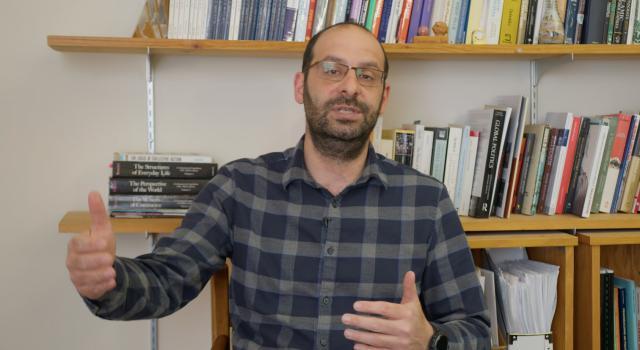Economics
Students at Hampshire College often make political economy a core component of their academic concentration, which may address such areas as "Public Health in Latin America," "Economics and the Environment," or "Women and Social Change."
We encourage students to enroll in Five College courses in economics and in broader aspects of political economy. Division III projects in economics have drawn on such topics as globalization, labor organizing, campaign finance, prisons, international economic development, and alternative business.
Student Project Titles
- Building Social Capital Through Cause-Related Marketing
- A New Development Model: Maximizing Social Welfare and Capabilities
- Development Practices in Rural India
- Lifting Our Skirts in Protest: Traditional Insult and Women's Resistance to Colonialism in Kenya and Nigeria
- 'Better to Starve Fighting them then to Starve Working' The Lawrence Textile Strike of 1912
- The Crux of Rationality in the (Often Irrational) Financial Sector
- The Role of Natural Resources in Contemporary Civil Wars: The Case Study of Angola
- Empirical analysis of migration and remittances in Nepal
Sample First-Year Course
Gender and Work in the Global Economy
This course focuses on the labor market transformations that have resulted from economic restructuring informed by neoliberal policies and the reorganization of production in high and low income countries over the last three decades or so. The course analyzes the gendered dimensions of these processes, points out the contradictory tendencies at work and emphasizes the shared concerns of workers across the globe.
Among the questions that will be addressed in the course are the following: what repercussions have these changes in the structure of production in the world economy had on employment dynamics in high- and low-income countries? What does the feminization of the labor force mean, and how is it different from the feminization of labor? What are the main developments that have contributed to labor market informalization? What are the gendered implications of these trends? Can we generalize across countries? Is there a role for government policy, international labor standards, as well as social and political activism across borders in raising wages, promoting equal opportunity, fighting discrimination in the workplace, and securing greater control over working hours and conditions?
Sample Courses at Hampshire
- African Economic Development
- American Capitalism
- American Government
- Buddhist Economics
- Controversies in United States Economic and Social History
- The Culture and Political Economy of Tourism
- Economics and the Environment
- Economic Development
- Economic Theory for Social Analysis
- The Environment, Resources, and World Security
- Feminist Economics
- Gender and Economic Development
- Gender, Race, and Class
- Gender and Work in the Global Economy
- Globalization and Africa
- History of Economic Thought
- Introduction to Economics
- Labor Economics
- New U.S. Economy: Issues/Perspectives
- North-South or South-South? International Economic Relations in the Era of Globalization
- Oil and the Transformation of the Middle Eastern Economies
- Oil Spill Economics and Politics
- Political Economy of Food
- Poverty and Wealth
- South-South Economic Relations
- Third World, Second Sex
- United States Labor History
- Welfare Policy in American History
- Women on Top? Understanding and Challenging Gender Hierarchy in the Workplace
- World Trade & the WTO
Through the Consortium
- Advanced Economic Theory (UMass)
- Advanced Topics in Economic Health and Development (MHC)
- International Monetary Fund (UMass)
- Introductory Macroeconomics (SC)
- Introductory Microeconomics (SC)
- Law and Economics (AC)
- Statistics for Economists (SC)
Facilities and Resources
Five College Resources
Gordon Hall at the University of Massachusetts Amherst houses three related organizations that can serve as a resource for Hampshire students:
The Political Economy Research Institute (PERI) is actively engaged in research, dissemination, policy advising, and education. It regularly sponsors conferences and other public events in its areas of research focus. Established in 1998, PERI is an independent unit at the University of Massachusetts with close ties to the department of Economics and Five College economics students. The Institute is committed to addressing basic issues of human and ecological well-being through research written for the general public, policy makers, and academic audiences. PERI researchers are currently involved in three broad and interrelated areas: globalization and macroeconomics; labor markets and living wages; and development, peace-building, and the environment.
The Center for Popular Economics, a nonprofit collective of political economists, is a welcoming resource for Five College students interested in economics. They examine root causes of economic inequality and injustice including systems of oppression based on race, class, gender, nation, and ethnicity. The center offers internship opportunities as well as resources for students.
The national headquarters of the Union for Radical Political Economics (URPE) is now located in Amherst. URPE, founded in 1968, has as its core purpose to be an alternative professional organization for left political economists and an intellectual home for academics, policy-makers, and activists who are interested in participating in a left intellectual debate on theoretical and policy issues. It publishes a newsletter, the Review of Radical Political Economics (RRPE), and sponsors a summer conference and a program at the annual economics meetings, which are open to undergraduates and graduate students as well.



